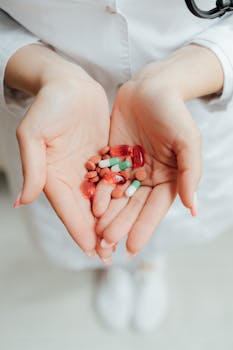
**
Urgent Recall: 17 High-Risk Indian Drugs to Immediately Discard – Anxiety Pills, Painkillers & More
The Central Drugs Standard Control Organisation (CDSCO), India's drug regulator, has issued a stark warning, urging immediate disposal of 17 high-risk medications. This significant action highlights growing concerns about substandard and spurious drugs circulating within the Indian pharmaceutical market. The recall affects a range of commonly used medicines, including painkillers, anxiety pills, and other vital medications. This article details the recalled drugs, the dangers they pose, and crucial steps you need to take to protect your health and safety.
Why the Urgent Recall?
The CDSCO's action is a direct response to growing evidence of substandard and spurious drugs flooding the market. These drugs may contain incorrect dosages, harmful impurities, or be entirely inactive, rendering them ineffective and potentially dangerous. The implications for public health are severe, as patients relying on these medications may experience treatment failure, adverse reactions, or even life-threatening consequences. The regulator cited manufacturing irregularities, quality control issues, and failures to meet safety standards as primary reasons for the recall. This is a significant development in India's ongoing struggle to combat the proliferation of counterfeit drugs.
The List of High-Risk Medications: What to Watch Out For
The CDSCO has not publicly released a comprehensive list with brand names, focusing instead on highlighting the types of drugs involved. However, reports indicate the recall includes several commonly prescribed medicines across various therapeutic categories. These include:
- Analgesics (Pain Relievers): Several brands of commonly used painkillers, including both over-the-counter and prescription options, have been implicated.
- Anti-anxiety Medications: This is a particularly concerning aspect, given the delicate nature of anxiety treatments and the potential for worsening symptoms with ineffective medication.
- Antibiotics: The presence of substandard antibiotics is particularly dangerous, contributing to antibiotic resistance and ineffective treatment of bacterial infections.
- Cardiovascular Drugs: The potential for complications with cardiovascular medication is severe, necessitating immediate action if affected.
- Diabetes Medications: The recall impacts both oral and injectable diabetic medications, raising concerns about blood sugar control and potential complications.
What to Do if You Have Recalled Medications
If you suspect you may have any of the affected medications, DO NOT take them. The risks associated with consuming substandard or spurious drugs far outweigh any potential benefits. Here’s what you should do:
- Identify Affected Medications: Carefully examine your medicine cabinet and check the batch numbers and expiry dates against any official announcements or lists released by the CDSCO. Local pharmacies and media outlets may also publish relevant information.
- Proper Disposal: Do not flush these medications down the toilet. Instead, follow local guidelines for safe medication disposal. You may be able to return them to a pharmacy for proper disposal or follow specific instructions issued by the CDSCO. This prevents environmental contamination and ensures proper handling of potentially hazardous substances.
- Consult Your Doctor: Contact your doctor or pharmacist immediately to discuss alternative treatment options. They can help you find safe and effective replacements for the recalled medications and ensure your ongoing health and safety.
The Wider Problem: Counterfeit Drugs in India
This recall highlights the broader issue of counterfeit and substandard drugs in India. This problem is a major threat to public health, with potentially fatal consequences. The CDSCO is working to improve drug regulatory measures, including strengthening inspection processes, enhancing testing capabilities, and implementing stricter penalties for manufacturers violating regulations. However, the fight against substandard drugs requires a multi-pronged approach involving increased public awareness, stronger collaboration between regulatory bodies, and a commitment from manufacturers to prioritize patient safety.
How to Avoid Counterfeit Drugs
While the recent recall is a significant event, proactive steps can minimize your risk of encountering counterfeit drugs:
- Buy from Reputable Pharmacies: Always purchase medications from licensed and registered pharmacies. Avoid buying drugs from unauthorized vendors or online sources that may not adhere to quality standards.
- Check Packaging Carefully: Look for any inconsistencies in packaging, such as misspellings, blurry printing, or unusual colors. Compare the product against genuine examples if possible.
- Verify Batch Numbers: The CDSCO's website may provide updates and lists of recalled drugs. Check the batch number of your medications against any recall notices.
- Report Suspicious Drugs: If you suspect a drug is counterfeit, report it to the CDSCO or your local health authorities.
Conclusion: Prioritizing Patient Safety
The recall of 17 high-risk medications serves as a stark reminder of the importance of robust drug regulation and patient vigilance. By taking proactive steps to identify and dispose of potentially harmful medications, and by prioritizing purchases from reputable sources, individuals can significantly reduce their risk. This situation underscores the need for continued vigilance and highlights the crucial role played by regulatory bodies in safeguarding public health. The ongoing battle against substandard drugs requires a collective effort, encompassing both regulatory action and informed consumer choices. This is not just about avoiding a specific set of drugs; it's about ensuring access to safe and effective healthcare for all. The consequences of inaction are too severe to ignore.




















